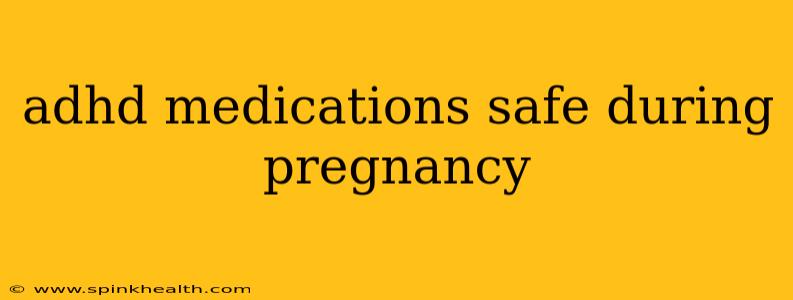The journey to motherhood is a transformative experience, filled with joy, anticipation, and, for many women, the added complexity of managing pre-existing conditions. For women with ADHD (Attention-Deficit/Hyperactivity Disorder), this journey presents a unique set of challenges, particularly concerning medication. The question, "Are ADHD medications safe during pregnancy?" is understandably paramount, and deserves a thorough and nuanced exploration. This isn't a simple yes or no answer, but rather a careful consideration of risks, benefits, and individual circumstances.
My name is Dr. Eleanor Vance, and I've spent over 15 years working with women managing ADHD throughout their lives, including during pregnancy and postpartum. This article aims to provide accurate, evidence-based information, but it's crucial to remember that this is not a substitute for personalized medical advice. Always consult with your doctor or a qualified healthcare professional before making any decisions regarding your medication.
What are the Common ADHD Medications?
Before diving into the safety concerns, let's briefly discuss the most commonly prescribed ADHD medications. These fall into two main categories: stimulants and non-stimulants. Stimulants, like methylphenidate (Ritalin, Concerta) and amphetamine-based medications (Adderall, Vyvanse), are generally the first-line treatment for ADHD. Non-stimulants, such as atomoxetine (Strattera) and guanfacine (Intuniv), are often used as alternatives, particularly in cases where stimulants are unsuitable or ineffective.
Are ADHD Medications Safe During Pregnancy? The Complex Answer
The short answer is: it's complicated. There's no single, definitive answer regarding the complete safety of any ADHD medication during pregnancy. The decision to continue or discontinue medication during pregnancy requires a careful balancing act, weighing the potential risks to the developing fetus against the potential risks of untreated ADHD for both the mother and the pregnancy itself.
Untreated ADHD in pregnancy can lead to several challenges:
- Increased stress and anxiety: This can negatively impact both maternal and fetal well-being.
- Difficulty managing daily tasks: This can affect prenatal care adherence and overall pregnancy management.
- Sleep disturbances: Lack of sleep can further exacerbate other symptoms and pose risks.
- Increased risk of accidents: Impulsivity and inattention can increase the risk of accidents, potentially harmful during pregnancy.
What are the Potential Risks of ADHD Medications During Pregnancy?
While research suggests that many ADHD medications carry a relatively low risk of major birth defects, some potential risks have been identified. These can vary depending on the specific medication and the dosage. Some studies suggest possible links to:
- Preterm birth: Giving birth prematurely can lead to various health complications for the baby.
- Low birth weight: Babies with low birth weight may face higher risks of health problems.
- Cardiovascular issues: While rare, some studies have investigated potential cardiovascular effects.
It's crucial to note that these are potential associations, and not necessarily cause-and-effect relationships. Further research is ongoing to clarify these links.
Which ADHD Medications are Considered Relatively Safer During Pregnancy?
There's no universally agreed-upon "safest" medication. However, some studies suggest that atomoxetine (Strattera) might carry a lower risk of certain adverse effects compared to stimulants. However, even with atomoxetine, the decision should be made in close consultation with a healthcare professional who can consider individual circumstances.
What About Breastfeeding and ADHD Medications?
The decision to breastfeed while taking ADHD medication also requires careful consideration. Some medications are passed through breast milk, and their potential impact on the infant needs to be assessed. Again, this is a decision that requires close collaboration with your doctor to weigh the benefits of breastfeeding against any potential risks to the infant.
How Can I Manage My ADHD Symptoms During Pregnancy Without Medication?
Non-pharmacological approaches can be beneficial, but they are rarely sufficient alone. These approaches might include:
- Therapy: Cognitive Behavioral Therapy (CBT) can provide valuable coping strategies.
- Lifestyle changes: Improving sleep hygiene, adopting a healthy diet, and regular exercise can help manage symptoms.
- Support groups: Connecting with other women who have ADHD can offer valuable emotional support.
What Should I Do If I'm Concerned About My ADHD Medication During Pregnancy?
Your healthcare provider is your best resource. Schedule an appointment to discuss your concerns, thoroughly review your medical history, and collaboratively create a plan that prioritizes both your well-being and the health of your baby. Open and honest communication is key. Don't hesitate to ask questions and express your anxieties.
Remember, this information is for educational purposes only. Always consult with your healthcare professional before making any decisions regarding your medication or treatment plan during pregnancy or breastfeeding. Your health and the health of your baby are paramount.

